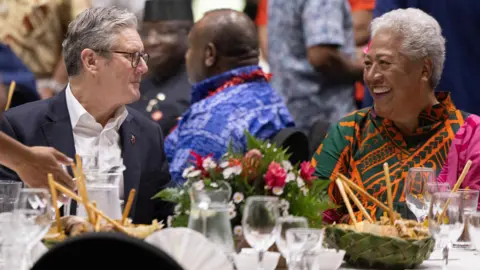 UK Government
UK GovernmentThe UK is “not going to be paying out” reparations for the transatlantic slave trade, Chancellor Rachel Reeves has told the BBC.
She said she understood why Commonwealth leaders would be making such demands but it was not something the UK government would commit to.
The legacy of slavery will be raised by the leaders at their summit in Samoa, which Prime Minister Sir Keir Starmer is attending.
Ahead of Friday’s meeting, he said he wanted to discuss current challenges, especially climate change, rather than issues of the past.
“That’s where I’m going to put my focus – rather than what will end up being very, very long endless discussions about reparations,” he said.
“Of course slavery is abhorrent to everybody; the trade and the practice, there’s no question about that. But I think from my point of view… I’d rather roll up my sleeves and work… on the current future-facing challenges.”
The chancellor reiterated that message in an interview with the BBC, saying: “We’re not going to be paying out the reparations that some countries are speaking about.
“I understand why they make those demands but that’s not something that this government is doing.”
Commonwealth leaders at the Samoa summit are expected to defy the UK and debate ways of securing reparations for historical slavery. At its height, Britain was the world’s biggest slave-trading nation.
Downing Street insists the issue is not on the agenda for the summit of 56 Commonwealth countries.
But diplomatic sources said officials were negotiating an agreement to conduct further research and begin a “meaningful conversation” about an issue which could potentially leave the UK owing billions of pounds in reparations.
Frederick Mitchell, foreign minister of the Bahamas, believes the UK could change its stance and he told BBC Radio 4’s Today programme: “Once you broach the subject it may take a while for people to come around but come around they will.”
Reparatory justice for slavery can come in many forms, including financial reparations, debt relief, an official apology, educational programmes, building museums, economic support, and public health assistance.
Mr Mitchell told the Commonwealth gathering: “It’s a simple matter – it can be done, one sentence, one line.”
He said to the BBC: “The word is apologise, that’s the word.”
Asked how much reparations should amount to, he said it was not just a matter of money but of “respect, acknowledging the past was a wrong that needs to be corrected”.
He said member countries “want the conversation to start” but “there appears to be even a reluctance to have the conversation”.
Earlier, a UK government spokesperson said: “Reparations are not on the agenda for the Commonwealth Heads of Government meeting. The government’s position has not changed – we do not pay reparations.
“We are focused on using the summit at [the Commonwealth Heads of Government Meeting] to discuss the shared opportunities which we can unlock across the Commonwealth – including securing more economic growth.”
It is understood the Downing Street position – that reparatory justice is not on the agenda – while technically correct, has angered some Caribbean ministers when it was obvious the issue would be discussed at the summit.
‘Sorrow and regret’
King Charles is in Samoa for a four-day visit and is due to formally open Friday’s summit.
On a visit to Kenya last year, the King expressed the “greatest sorrow and regret” over the “wrongdoings” of the colonial era, but stopped short of issuing an apology, which would have required the agreement of ministers.
Some non-Caribbean countries are not unsympathetic towards the British position and want the summit to focus more on existing challenges – such as climate change, which is adversely affecting many Commonwealth countries, about half of whom are small island states.
But Caribbean countries seem determined to keep pressing the issue.
All three candidates hoping to be elected this weekend as the next secretary general of the Commonwealth – Shirley Botchwey of Ghana, Joshua Setipa of Lesotho and Mamadou Tangara of Gambia – have made clear they support reparatory justice.



